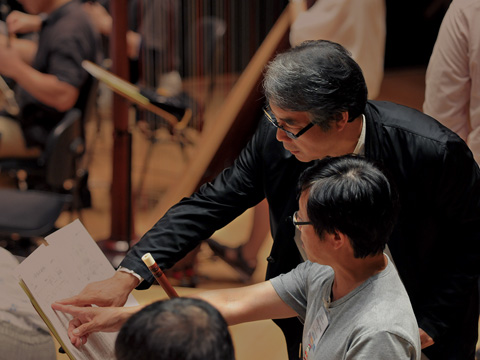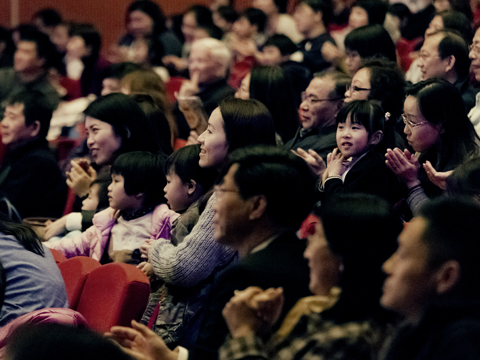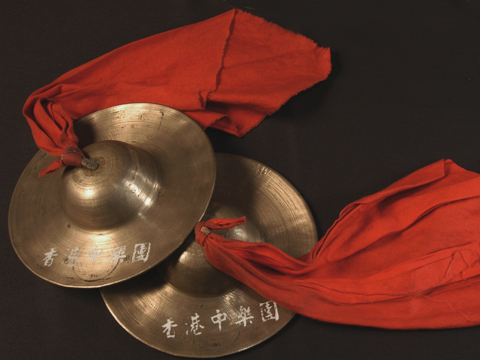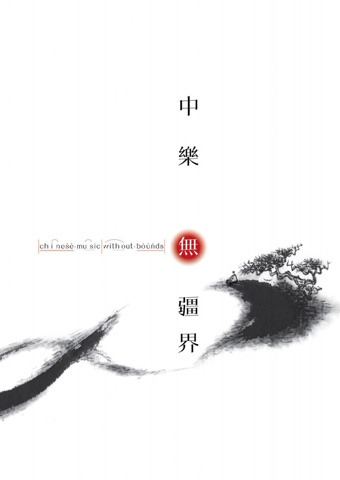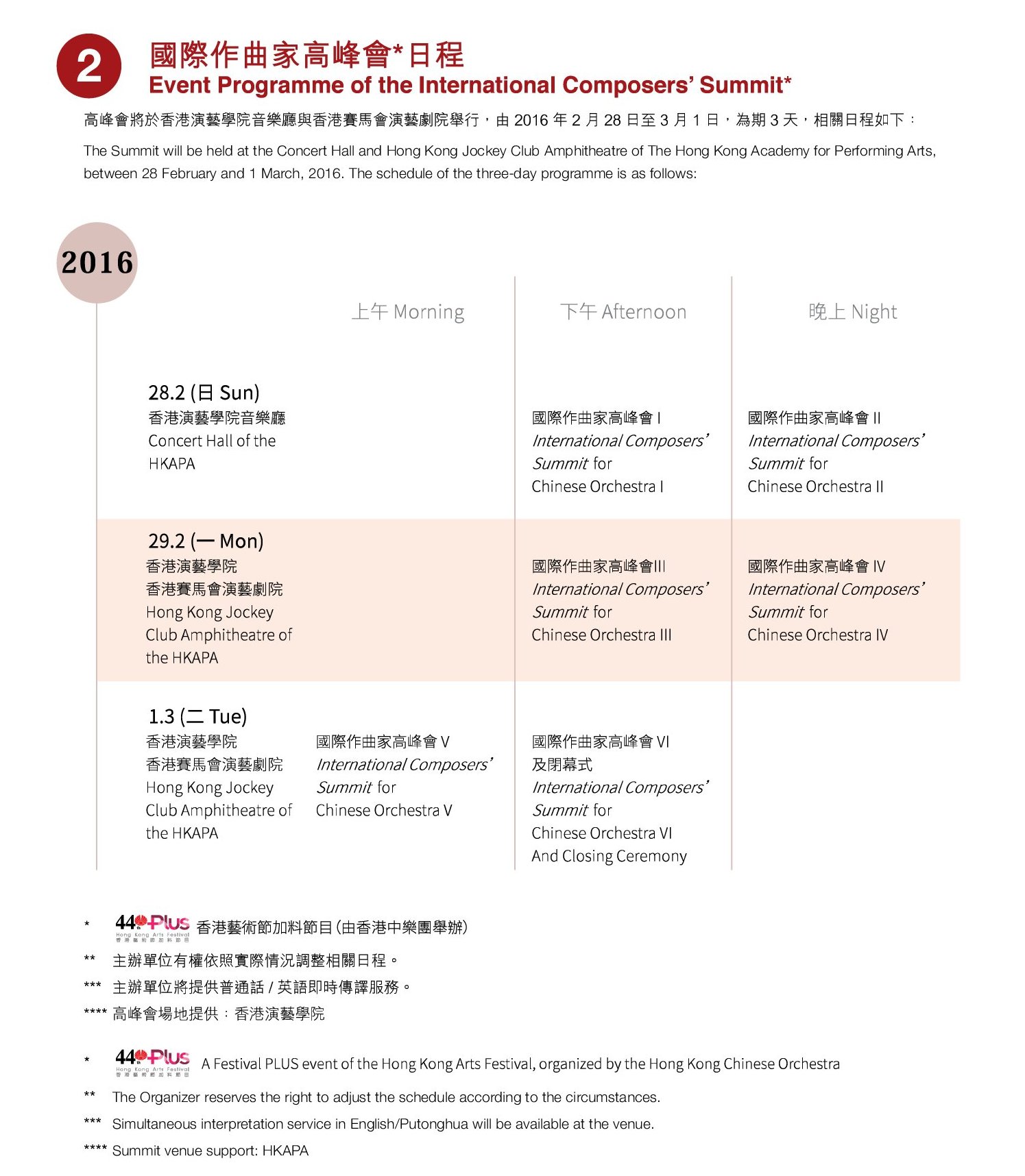
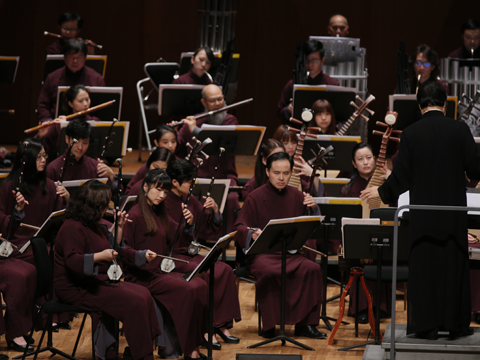
HKCO
Hong Kong Chinese Orchestra Environmental, Social and Governance Artistic Director and Principal Conductor for Life Orchestra Members Council Advisors & Artistic Advisors Council Members Management Team Vacancy Contact Us (Tel: 3185 1600)

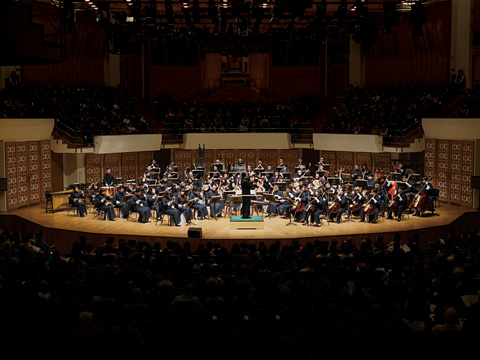
Concerts

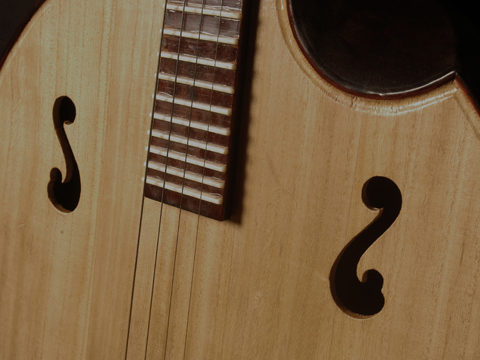
Education
The HKCO Orchestral Academy Hong Kong Youth Zheng Ensemble Hong Kong Young Chinese Orchestra Music Courses Chinese Music Conducting 賽馬會中國音樂教育及推廣計劃 Chinese Music Talent Training Scheme HKJC Chinese Music 360 The International Drum Graded Exam

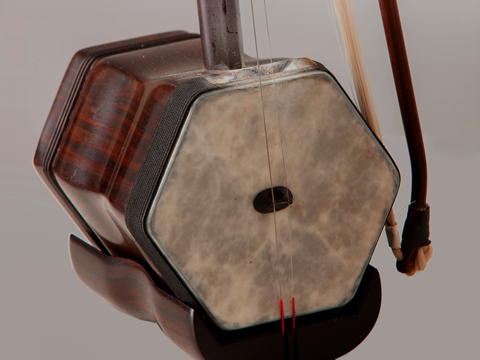
Instrument R&D
Eco-Huqins Chinese Instruments Standard Orchestra Instrument Range Chart and Page Format of the Full Score Configuration of the Orchestra
39th Orchestral Season
View Event Calendar
Full List Calendar
Chinese Music Without Bounds
Discovery
Chinese Music Without Bounds - International Composers' Summit
Date and Time
28-29/2, 1/3/2016 8:00pm
Venue
The Hong Kong Academy for Performing Arts
Ticket Fee
$500
Chinese Music Without Bounds is an international music event to be organized by the Hong Kong Chinese Orchestra during the 2016 International Composers’ Summit, with the purposes of offering a platform for sharing of compositional insights and presentation of music-specific instrumentation means. We will also partner with local and international composers’ societies for the 2017 International Composition Competition, with a view to enhancing the Chinese orchestral repertoire.
Since our establishment in 1977, the HKCO has been actively promoting new works by commissioning original compositions as well as arrangements. The number comes to a total of over 2,300, and is recognized by music circles at home and abroad as a tremendous input to Chinese music as a genre. Our accolades include:
Since our establishment in 1977, the HKCO has been actively promoting new works by commissioning original compositions as well as arrangements. The number comes to a total of over 2,300, and is recognized by music circles at home and abroad as a tremendous input to Chinese music as a genre. Our accolades include:
‘The Most Outstanding Achievement in Advancing Contemporary Chinese Music’, presented by the ISCM World Music Days Hong Kong – 2002
‘The Most Outstanding Achievement in Advancing Asian Contemporary Music’, presented by the Asian Composers League – 2007
While apart from the HKCO, Chinese orchestras in other parts of the world have also been commissioning and promoting new works for full-scale Chinese orchestral music. The hard work of music-makers has paid off and many outstanding compositions have been added to the repertoire. However, there were many others that failed because the composers were unfamiliar with the performing techniques of Chinese musical instruments, instrumentation and the musical idiom. In view of this, the HKCO is holding a worldwide event entitled Chinese Music Without Bounds. The objectives are as follows:
‘The Most Outstanding Achievement in Advancing Asian Contemporary Music’, presented by the Asian Composers League – 2007
While apart from the HKCO, Chinese orchestras in other parts of the world have also been commissioning and promoting new works for full-scale Chinese orchestral music. The hard work of music-makers has paid off and many outstanding compositions have been added to the repertoire. However, there were many others that failed because the composers were unfamiliar with the performing techniques of Chinese musical instruments, instrumentation and the musical idiom. In view of this, the HKCO is holding a worldwide event entitled Chinese Music Without Bounds. The objectives are as follows:
- To make Chinese orchestral music a showcase platform for international composers. Our goal is to transform Chinese orchestral music into an international musical idiom, understood and accepted by the global community. We will not only promote Chinese orchestral music as an art form in Hong Kong and around the world, but also launch outstanding composers of Hong Kong onto the international plane by showing what they can create.
- To encourage composers to write for the Chinese orchestra, and to find young talents in Hong Kong and in the international arena. We shall take the works of previous composers as the basis for reference in future music-writing, and the springboard for elevating the artistic standard of future compositions. We shall work closely with local and international partners to give Chinese music impetus to grow, and to provide contemporary works of excellence for cultural exchange on the international stage.
Message from the Artistic Director
The lifeline for Chinese music is composition of new works, so composers play a pivotal role in this regard. Their input is an energy source that empowers the genre for its continuum and for the nourishment of the listener’s soul.
Dubbed ‘a cultural ambassador of Hong Kong’, the Hong Kong Chinese Orchestra is honoured to contribute a part to Chinese music as an art. To date, we have commissioned over 2,300 compositions or arrangements from composers in Europe, North America, Africa and Asia. With the growing influence of Chinese culture on the international front today, many more composers are joining the legion to write Chinese orchestral music. The sharing of expertise, experience as well as research findings has become all the more important. With this macro perspective, we have chosen ‘music without bounds’ as the theme for our two upcoming events, the 2016 International Composers’ Summit and the 2017 International Composition Competition. For the former, we will invite notable composers who have written for Chinese orchestra to share with music colleagues the various compositional and orchestration aspects that have made their works a success. They will discuss how to achieve optimal effects through orchestral configuration and acoustic considerations, or more specifically, through notation, orchestration and instrumentation. This would be beneficial not only for young composers but also for professional colleagues. As for the latter, the event aims to nurture young blood, encourage creativity and provide a platform for budding composers from China and other parts of the world to showcase their works. This is in keeping with our mission to ensure a sustainable development of Chinese music in Hong Kong.
The keynote speakers at the Summit have all experienced the arduous journeys of experimenting over and over again how to write music that connects. There is an empirical experience that no imagination can match. As Richard Tsang, Founding Chairman of the Hong Kong Composers’ Guild, said, “Composing a piece is like sending out ten scouts to find the way. Nine meet their unfortunate end, and only one returns safe and with directions to go ahead; yet whether it is a through road or not, nobody knows. The important thing is that at least he has paved the path for others to follow. This is the way forward for Chinese music as I see it.” All the keynote speeches and experience-sharing proceedings will be made into a digital archive available online, so that young composers can access them from anywhere, anytime, in the future, while music enthusiasts from all corners of the globe can get to know and enjoy the charm of Chinese orchestral music.
We at the HKCO believe that Chinese music has a universality that breaks boundaries, and our goal is to scale musical heights. We look forward to the upcoming opportunities to meet composers from all parts of the world and share our passion for music – we look forward to welcoming you!
Dubbed ‘a cultural ambassador of Hong Kong’, the Hong Kong Chinese Orchestra is honoured to contribute a part to Chinese music as an art. To date, we have commissioned over 2,300 compositions or arrangements from composers in Europe, North America, Africa and Asia. With the growing influence of Chinese culture on the international front today, many more composers are joining the legion to write Chinese orchestral music. The sharing of expertise, experience as well as research findings has become all the more important. With this macro perspective, we have chosen ‘music without bounds’ as the theme for our two upcoming events, the 2016 International Composers’ Summit and the 2017 International Composition Competition. For the former, we will invite notable composers who have written for Chinese orchestra to share with music colleagues the various compositional and orchestration aspects that have made their works a success. They will discuss how to achieve optimal effects through orchestral configuration and acoustic considerations, or more specifically, through notation, orchestration and instrumentation. This would be beneficial not only for young composers but also for professional colleagues. As for the latter, the event aims to nurture young blood, encourage creativity and provide a platform for budding composers from China and other parts of the world to showcase their works. This is in keeping with our mission to ensure a sustainable development of Chinese music in Hong Kong.
The keynote speakers at the Summit have all experienced the arduous journeys of experimenting over and over again how to write music that connects. There is an empirical experience that no imagination can match. As Richard Tsang, Founding Chairman of the Hong Kong Composers’ Guild, said, “Composing a piece is like sending out ten scouts to find the way. Nine meet their unfortunate end, and only one returns safe and with directions to go ahead; yet whether it is a through road or not, nobody knows. The important thing is that at least he has paved the path for others to follow. This is the way forward for Chinese music as I see it.” All the keynote speeches and experience-sharing proceedings will be made into a digital archive available online, so that young composers can access them from anywhere, anytime, in the future, while music enthusiasts from all corners of the globe can get to know and enjoy the charm of Chinese orchestral music.
We at the HKCO believe that Chinese music has a universality that breaks boundaries, and our goal is to scale musical heights. We look forward to the upcoming opportunities to meet composers from all parts of the world and share our passion for music – we look forward to welcoming you!
Artistic Director and Principal Conductor
Hong Kong Chinese Orchestra
Yan Huichang
Schedule of Ancillary Activities of Chinese Music Without Bounds
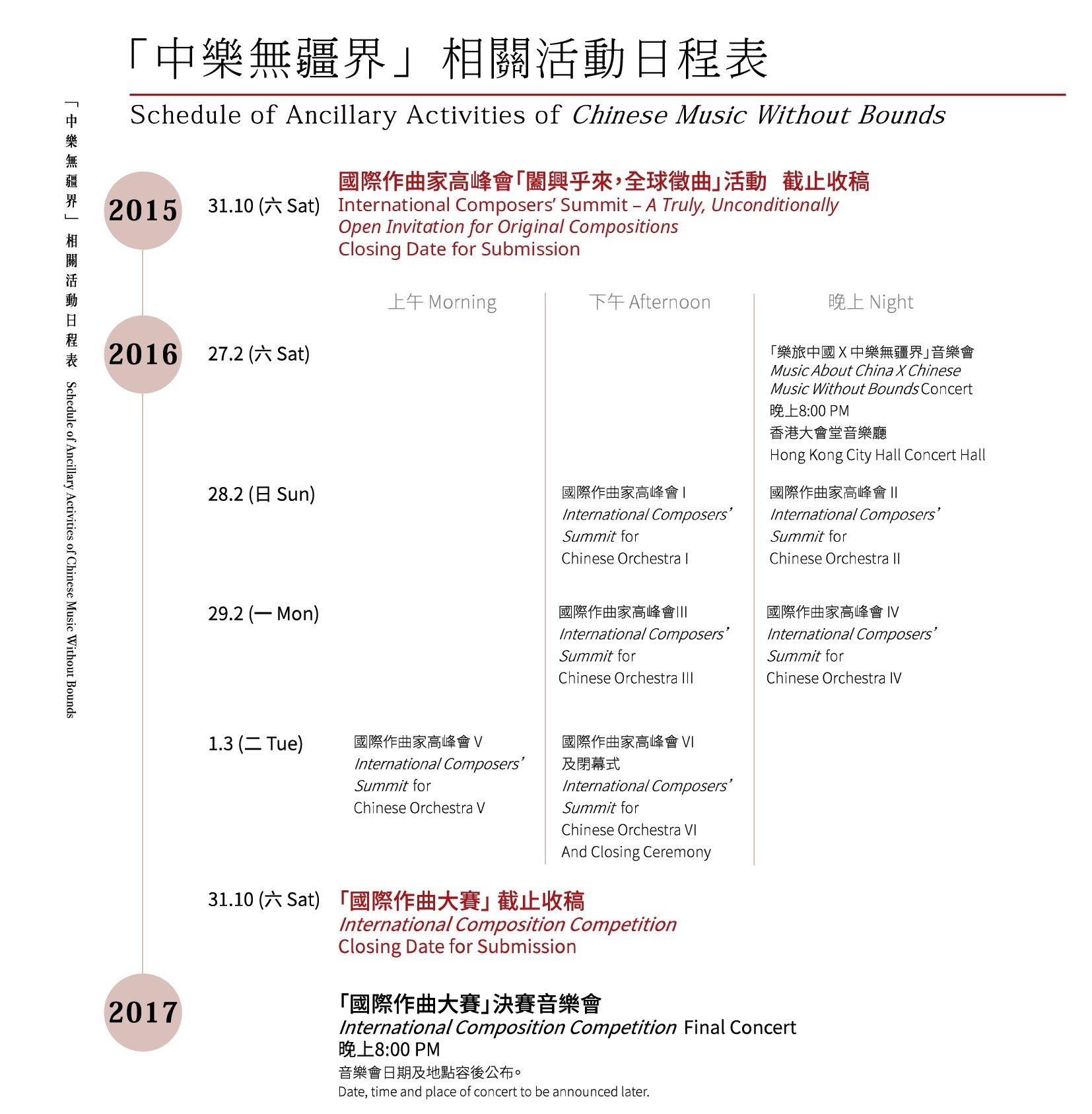
Between Crafted Creation and Essential Experience:
Foreword to the Chinese Music Without Bounds International Composers’Summit
Foreword to the Chinese Music Without Bounds International Composers’Summit
Chow Fan-fu
Since the Hong Kong Chinese Orchestra first hosted the international symposium, Retrospect and Development of Modern Chinese Orchestra, in 1997, the upcoming Chinese Music Without Bounds – International Composers’ Summit marks the fifth music composition exchange in twenty years for the Orchestra. Every one of these events has been both a parade of works and sharing among composers, as well as a platform for mutual stimulation and encouragement to embark on a higher plane.The Contradiction between the Development of Music and Artistic Creation
The development of music in the history of mankind is a cultural evolution with an element of contradiction. Music as an art form requires that the spirit it pursues and represents is the fruit of an essential experience. What the music unfolds should be ‘true’ emotions and ‘true’ perceptions. Yet the act of creating is in itself a ‘crafting’ or even ‘crafty’ process, revealing the hard fact that music, like all other art forms, is created from naught in order to present the essential truth.
At the same time, what is more intricate and complex about music is that whether the composer can touch the audience’s heart through this ‘crafting’ process is often the litmus test for the ‘truth’ value of a piece. It involves several stages: composition, performance (a second creative stage where notations are turned into acoustics and music), reaching out to the audience, and the critics’ feedback to the composer, and covers technical, aesthetic and psychological aspects.
Music has developed under the momentum of musical composition that carries this element of ‘contradiction’. In past centuries, society was simpler, and music composition was often the creative activity of composers as individuals. When a work was completed, through its public performance and critics’ review, it would lead to contact and exchange among fellow composers, whose mutual stimulation would trigger and produce a trend that would promote music development. In other words, it is a highly individual creative process that requires group facilitation. How to alleviate the contradiction between ‘individual’ and ‘group’ is paramount for forming a momentum for music development.
Self-confidence to Drive Chinese Music Forward
Once the above is established, it can be easily seen that the continued advance of music of mankind is a long and winding road that defies prediction, swayed by both subjective and objective factors. The development of Chinese music in the past century or so has in particular undergone many twists and turns. The thousand-year long history of Chinese music has been one of incorporating instruments from different ethnic groups, cultures and especially different instruments in its geographical periphery. It was only from the Qing dynasty onwards, when the country weakened, that Chinese music became ‘second-class’ to Western music, thus losing its former momentum to go forward. But in tandem with global progress, Chinese music picked up momentum again from the 1980’s onwards, giving rise to a renewed self-confidence and energy for development.
Less than a hundred years ago, Zheng Jinwen established the Datong Music Society in 1920 (its predecessor being the Qinse Xueshe established in 1918); and in 1929, he formed an orchestra which can be seen as the prototype of the full-scale Chinese music orchestra. This form of ‘new music’, born in China at a time when the tyranny of Western music was taking the country by storm, was labelled as ‘aping’ Western orchestras. But after more than a century’s explorative efforts by musicians and experience gained through failure, this kind of full-scale Chinese music ensembles, under different monikers and despite doubts and misgivings, have undoubtedly secured their footing as an important Chinese musical ‘tool’ that holds the life, emotions and faces of contemporary Chinese people.
Goals can Drive Composers
The assured status of the full-scale Chinese orchestra depends not on economic strength, nor political power, but on the quantity of mature works purpose-written for this format. Only if such musical compositions continue to give momentum to the advance of Chinese music can full-scale Chinese orchestras exist like their counterparts in the West. This is also the reason why the Western symphony orchestra has become the global ‘musical tool’ for showcasing different ethnic emotions.
At a time when society is entering the global cyber age of the 21st century, it is clear the fate of the full-scale Chinese orchestra is closely bound with music composition. In the past decade or so, the Hong Kong Chinese Orchestra has hosted the ‘International Competition for Chinese Orchestral Composition 2000’ and ‘Chinese Orchestra Composition Symposium’ (2000), the seminar ‘On the Ecology of Chinese Music in a Modern Environment and its Future Development’ (2002), and ‘The Fourth International Symposium on Chinese Music – Tradition and Evolution’ (2007). Its purpose is clear: apart from enhancing creative energy to continue with consolidation of the existential status of the full–scale Chinese orchestra, these events were important platforms for exchange to promote the development of Chinese music.
Haring Authentic Experience in the Pursuit of True Essence in Composition
As in past years, apart from providing a platform for exchange and socializing for composers from different parts of the world and individuals interested in musical composition, this ‘Chinese Music Without Bounds – International Composers’ Summit’ will encourage more concrete exchange through sharing of experience in composition. Works will be used and even demonstrated and performed live by the orchestra for analysis and interactive exchange, which is a more ‘authentic’ kind of sharing. Through this event, what is originally an individual, ‘crafting’ creative process and ‘truth-seeking’ exercise will be shared in an interactive manner, so that a collective effort can be made to explore in a more concrete way regarding orchestration, counterpoint, and even orchestra configuration and performance effect for Chinese orchestra, which still has ample room for improvement.
Besides, the discussion will probe more deeply and more concretely problems that have been overlooked but which constitute obstacles for the development of Chinese music, e.g. the reformed sound effect of Eco-Huqin on composition and orchestration, the standard configuration of modern full-scale Chinese orchestras, notation systems, performance techniques, and even standardization of Chinese and English names for instruments. Also, this event will arrange especially for orchestra musicians to share their experience of the secondary creative process of turning notation into acoustics and music. The fruit of such sharing and study will have a positive stimulating effect on Chinese orchestral compositions.
Incorporating Foreign Culture to Strengthen Momentum
Undoubtedly, the three to four hundred years of development of Western orchestras can provide useful reference for full-scale Chinese orchestras in terms of orchestration and counterpoint, or even the surge of unconventional music systems of the 20th century. More radically, some composers have paired Chinese instruments (solo) with Western symphony orchestras, and vice versa. Although some advances have been made, there is still ample room for development and exploration.
It can be said that an era of Chinese music incorporating foreign music culture to strengthen its developmental momentum has begun anew. The naming of this event as ‘Chinese Music Without Bounds’ by the HKCO is to elevate it to a level that transcends borders and barriers. It means more than the participation of foreign composers with experience of Chinese music composition to view Chinese music as an integral part of music development of all mankind. Only by doing so can Chinese music and Chinese music orchestras look forward to the arrival of a glorious hour! In any case, the achievements and catalytic effect of the symposium will have a positive effect on the upcoming international composition competition since the last International Competition for Chinese Orchestra Composition held in 2000. We can anticipate more mature Chinese orchestral works to appear.
With this wish, I dedicate this foreword to the summit.
Music About China X Chinese Music Without Bounds Concert
Traversing East, West, the Past and the Present
The development of Chinese symphonic music hinges upon the building of the repertoire, with a constant input of new, original compositions which open up channels between Chinese music culture and the rest of the world. Leading composers have contributed to the symphonization of Chinese instrumental music over the decades with their consummate understanding of Chinese culture and mastery of compositional idioms by breaking down cultural, temporal or spatial boundaries.
To tie in with the theme of Chinese Music Without Bounds of the symposium, this concert features some milestone works in Chinese orchestral music distinguished by orchestration. They include Doming Lam’s Autumn Execution (1993) which was one of the ‘Twentieth Century Chinese Music Classics’; Peng Xiuwen’s As the Moon Rises, which is a lyrical, impressionistic depiction of a moonlit scene through his ingenious orchestration; Zhao Jiping’s Raise the Red Lantern, a work that has been recognized the world over through the soundtrack scores on television and in the cinema; Guo Wenjing’s Chou-Kong-Shan (‘Sorrowful, Desolate Mountain’), a milestone in the history of development of the Chinese bamboo flute; Dirk Bosse’s Hallow-e’en Dances, a piece that may be described as ‘Chinese music written with a macro angle’ by a Western composer; and Liu Xing’s Symphony No. 2 for Chinese Orchestra, a monumental work fusing Chinese music with jazz, written in the 1980’s. The programme by itself is a conglomeration of rich and modern Chinese orchestral sounds, so come and join us as we soar in this magic realm where no boundaries exist!
27/2/2016 (Sat)
8:00pm
Hong Kong City Hall Concert Hall
As the Moon Rises Ancient Melody Arr. by Peng Xiuwen
Autumn Execution Doming Lam
A Sorrowful Tune Zhu Jian’er
Intermission
Symphonic Suite Raise the Red Lantern (Excerpt) for Chinese orchestra,
Peking Opera percussion instruments and female voice Zhao Jiping
The Hallow-e’en Dances (Excerpt) Dirk Brossé
Dizi Concerto
Chou-Kong-Shan (Sorrowful, Desolate Mountain) for zhudi and Chinese orchestra
Guo Wenjing
First Movement: Lento
Second Movement: Allegro
Third Movement: Andante-Allegro
Symphony No.2 for Chinese Orchestra Liu Xing
Booking Form Download

The development of Chinese symphonic music hinges upon the building of the repertoire, with a constant input of new, original compositions which open up channels between Chinese music culture and the rest of the world. Leading composers have contributed to the symphonization of Chinese instrumental music over the decades with their consummate understanding of Chinese culture and mastery of compositional idioms by breaking down cultural, temporal or spatial boundaries.
To tie in with the theme of Chinese Music Without Bounds of the symposium, this concert features some milestone works in Chinese orchestral music distinguished by orchestration. They include Doming Lam’s Autumn Execution (1993) which was one of the ‘Twentieth Century Chinese Music Classics’; Peng Xiuwen’s As the Moon Rises, which is a lyrical, impressionistic depiction of a moonlit scene through his ingenious orchestration; Zhao Jiping’s Raise the Red Lantern, a work that has been recognized the world over through the soundtrack scores on television and in the cinema; Guo Wenjing’s Chou-Kong-Shan (‘Sorrowful, Desolate Mountain’), a milestone in the history of development of the Chinese bamboo flute; Dirk Bosse’s Hallow-e’en Dances, a piece that may be described as ‘Chinese music written with a macro angle’ by a Western composer; and Liu Xing’s Symphony No. 2 for Chinese Orchestra, a monumental work fusing Chinese music with jazz, written in the 1980’s. The programme by itself is a conglomeration of rich and modern Chinese orchestral sounds, so come and join us as we soar in this magic realm where no boundaries exist!
27/2/2016 (Sat)
8:00pm
Hong Kong City Hall Concert Hall
Conductor: Yan Huichang
Dizi: Tang Junqiao
Dizi: Tang Junqiao
As the Moon Rises Ancient Melody Arr. by Peng Xiuwen
Autumn Execution Doming Lam
A Sorrowful Tune Zhu Jian’er
Intermission
Symphonic Suite Raise the Red Lantern (Excerpt) for Chinese orchestra,
Peking Opera percussion instruments and female voice Zhao Jiping
The Hallow-e’en Dances (Excerpt) Dirk Brossé
Dizi Concerto
Chou-Kong-Shan (Sorrowful, Desolate Mountain) for zhudi and Chinese orchestra
Guo Wenjing
First Movement: Lento
Second Movement: Allegro
Third Movement: Andante-Allegro
Symphony No.2 for Chinese Orchestra Liu Xing

International Composers’Summit - A Prospectus
Aims of the Summit
The success of a work for Chinese orchestra often hinges upon orchestration. Different choice of instruments yields different acoustic effects and styles. Yet there is still a lot of room to explore with regards to this aspect in Chinese music. In view of this, the International Composers’ Summit will include not only experience sharing sessions on writing this genre of music but also insights into orchestration. It is hoped that through the practical experience, all composers – especially the younger generation – will have a better understanding of the characteristics of Chinese musical instruments and go on to acquire a better knowledge of Chinese orchestration and configuration. The occasion will provide valuable reference for composers looking to participate in the Chinese Music without Bounds – International Composition Competition.
At the Summit, there will be live demonstrations by the HKCO on site. With the presentation by the respective composers, the participants can hear how different orchestration can produce a different orchestral voice, and hence the acoustic effect of different versions with the use of different instruments.
In order to encourage composers to write music for Chinese orchestra, an extension programme will be organized during the International Composers’ Summit, in the form of an open invitation to non-ethnic Chinese and to students of music composition to submit new, original works. The entries selected will be performed by the HKCO on site during the Summit, with the respective composers offered the opportunity to talk about the musical conceits, record the work being played, and conduct discussions for sharing and exchange.
More Information on the Summit
The Summit at a glance:
The success of a work for Chinese orchestra often hinges upon orchestration. Different choice of instruments yields different acoustic effects and styles. Yet there is still a lot of room to explore with regards to this aspect in Chinese music. In view of this, the International Composers’ Summit will include not only experience sharing sessions on writing this genre of music but also insights into orchestration. It is hoped that through the practical experience, all composers – especially the younger generation – will have a better understanding of the characteristics of Chinese musical instruments and go on to acquire a better knowledge of Chinese orchestration and configuration. The occasion will provide valuable reference for composers looking to participate in the Chinese Music without Bounds – International Composition Competition.
At the Summit, there will be live demonstrations by the HKCO on site. With the presentation by the respective composers, the participants can hear how different orchestration can produce a different orchestral voice, and hence the acoustic effect of different versions with the use of different instruments.
In order to encourage composers to write music for Chinese orchestra, an extension programme will be organized during the International Composers’ Summit, in the form of an open invitation to non-ethnic Chinese and to students of music composition to submit new, original works. The entries selected will be performed by the HKCO on site during the Summit, with the respective composers offered the opportunity to talk about the musical conceits, record the work being played, and conduct discussions for sharing and exchange.
More Information on the Summit
The Summit at a glance:
- This will be a platform for composers who have written music for Chinese orchestra, whether they are based in China or in other parts of the world, Chinese or non-Chinese, to share their insights into composition and orchestration by using their own works as examples.
- Works for Chinese orchestra with outstanding orchestration will be selected for demonstration by the HKCO on site for illustration purposes.
- There will be discussions on the notation and performance of contemporary Chinese music, the collation of information to standardize the naming of the instruments in a full-size Chinese orchestra, the way to configure such an orchestra, etc. This will form an information-sharing hub for the music community.
- To encourage composers to participate in this Summit, there will be an open invitation to submit works of three minutes’ duration and under. The entries selected will be performed by the HKCO live during the symposium, while the respective composers will be allowed to record their own works, followed by discussions. For more information, please refer to the prospectus.
- Furthermore, there will be another extension activity entitled “Ten Don’ts”. Musicians of the HKCO will point out the tonal range of the musical instruments used and their limitations in performance, so that composers will understand the instruments better in order to write music that will bring out the best in each. Chinese music enthusiasts and representatives of Chinese music groups will be invited to share the valuable experience they gleaned from rehearsals and commissioning works.
- During the Summit, there will be a special session entitled A Tribute to Music Maestros. HKCO’s Artistic Director, Yan Huichang, and Resident Conductor, Chew Hee-chiat, will give a presentation on the works of two important figures in modern Chinese music, Maestros Peng Xiuwen and Liu Wenjin.
Event Programme of the International Composers' Summit
International Composers’ Summit – A Truly, Unconditionally Open Invitation for Original Compositions and Registration Form
In order to encourage composers to write music for Chinese orchestra, an extension programme will be organized during the International Composers’ Summit, in the form of an open invitation for new works. The slogan for the activity is ‘A truly, unconditionally open invitation for original compositions’, and it is extended to anybody who is interested in creating music for Chinese orchestra, regardless of ethnicity, geographical locale and social standing. Those currently studying music are especially encouraged to take part. The entries selected will be performed by the HKCO on site during the symposium. The respective composers will be invited to give a presentation about the musical conceits behind their works, record them as being played, and conduct discussions for sharing and exchange.
Activity details:
Requirement: to write ensemble music for a full-size orchestra The submitted work should be written for the Hong Kong Chinese Orchestra according to the configuration specified, and of not more than 3 minutes’ duration. The Judges reserve the right to reject any entry found to be not in keeping with the configuration specified by the HKCO during the adjudicating process. (For the configuration and the tonal range of instruments for the Chinese orchestra, please refer to our booklet, or visit our website www.hkco.org )
Submission deadline:
All submissions should be sent by mail to reach the office of the Hong Kong Chinese Orchestra not later than 31 October, 2015 (by postmark date). Please mark on the envelope ‘International Composers’ Summit – A Truly, Unconditionally Open Invitation for Original Compositions’. Each submission should include one full score, the Registration Form duly filled in, the composer’s resume, and a digital score stored in a Sibelius 7 (or older version) or Finale 2014 (or older version) and PDF formats.
Performance:
Selected works will be performed by the Hong Kong Chinese Orchestra during the International Composers’ Summit in February, 2016. The registration fee for those who are selected will also be waived.
Download Invitation for Original Composition Registion Form
Activity details:
Requirement: to write ensemble music for a full-size orchestra The submitted work should be written for the Hong Kong Chinese Orchestra according to the configuration specified, and of not more than 3 minutes’ duration. The Judges reserve the right to reject any entry found to be not in keeping with the configuration specified by the HKCO during the adjudicating process. (For the configuration and the tonal range of instruments for the Chinese orchestra, please refer to our booklet, or visit our website www.hkco.org )
Submission deadline:
All submissions should be sent by mail to reach the office of the Hong Kong Chinese Orchestra not later than 31 October, 2015 (by postmark date). Please mark on the envelope ‘International Composers’ Summit – A Truly, Unconditionally Open Invitation for Original Compositions’. Each submission should include one full score, the Registration Form duly filled in, the composer’s resume, and a digital score stored in a Sibelius 7 (or older version) or Finale 2014 (or older version) and PDF formats.
Performance:
Selected works will be performed by the Hong Kong Chinese Orchestra during the International Composers’ Summit in February, 2016. The registration fee for those who are selected will also be waived.
Download Invitation for Original Composition Registion Form
International Composition Competition – A Prospectus
Aims, Objectives and Introduction
Historically, music developed through the continuous input of original compositions. The Hong Kong Chinese Orchestra has been dedicated to the encouragement of new works for Chinese orchestra. The orchestration of the works is regarded as the core concern. In this international competition, all restrictions regarding nationality, background and age have been lifted in order to promote the concept of the world being ‘a global village’, hence the theme ‘Music Without Bounds’. The aim is to discover talented composers and offer them a platform for showcasing their works and for exchange.
Eligibility
Adjudication
Copyright of the Original Works
Historically, music developed through the continuous input of original compositions. The Hong Kong Chinese Orchestra has been dedicated to the encouragement of new works for Chinese orchestra. The orchestration of the works is regarded as the core concern. In this international competition, all restrictions regarding nationality, background and age have been lifted in order to promote the concept of the world being ‘a global village’, hence the theme ‘Music Without Bounds’. The aim is to discover talented composers and offer them a platform for showcasing their works and for exchange.
Eligibility
- This competition is open to all, with no restrictions on age or nationality.
- The composition submitted must be a new work written within the last three years, has not been awarded any prize and has not been publicly released.
- If a contestant is entering both ‘Ensemble’ and ‘Solo and Orchestra’ sections, only one entry is allowed for each section.
Closing Date for Entries
All entries should be accompanied by a duly filled-in Entry Form, together with the necessary information as stated above, and sent by mail to: The Hong Kong Chinese Orchestra, 7/F, Sheung Wan Municipal Services Building, 345 Queen’s Road Central, Hong Kong, not later than 31st October, 2016 (by postmark date). Please mark on the envelope ‘International Composition Competition 2017’.
Content of the Work
Awards and Prizes
All entries should be accompanied by a duly filled-in Entry Form, together with the necessary information as stated above, and sent by mail to: The Hong Kong Chinese Orchestra, 7/F, Sheung Wan Municipal Services Building, 345 Queen’s Road Central, Hong Kong, not later than 31st October, 2016 (by postmark date). Please mark on the envelope ‘International Composition Competition 2017’.
Content of the Work
- The work submitted must be an original composition.
- The work can be either written for orchestra or for solo and orchestra.*
- Solo instrument may be one (and only one) of the following:
(1) Wind: dizi, sheng, suona, guan
(2) Bowed-string: gaohu, erhu, zhonghu, gehu and bass gehu
(3) Plucked-string: zheng, pipa, xiaoruan, zhongruan, daruan, sanxian
(4) Percussion: dagu (Chinese big drum), paigu (set of 5 rotodrums), sanmianluo (set of 3 gongs [not tuned]), muyu (set of 5 temple blocks)** - Works on Hong Kong themes should be specified upon application.
* Since the work should be written for a full-scale orchestra, it is advisable not to use amplification for solo instruments.
* * The contestant may use all, or any combination of the above instruments.
* * The contestant may use all, or any combination of the above instruments.
Awards and Prizes
| Original composition Best Orchestra Work Best Solo and Orchestra Work | Prize money HKD100,000 Prize money HKD100,000 |
| Best Work on a Hong Kong Theme | Prize money HKD20,000 |
| Outstanding Young Composer (Under 35) | Prize money HKD30,000 |
| Best Orchestration (1-3) | Prize money HKD20,000 |
| Audience Favourite Original Work – to be voted by the audience on site | Trophy |
Adjudication
- The entry work should be scored for a full-size Chinese orchestra, in accordance with the configurations provided by the HKCO (for details, please refer to ‘Configuration of the Orchestra’ on p.44), and must not exceed its stipulated number of musicians and musical instruments. In writing for the percussion section, please restrict to six parts as there are only six percussionists in the HKCO. Please indicate each part clearly on the full score by using the numbers 1 to 6.
- The duration of the work should be between 6 to 15 minutes. There is no restriction on the number of movements.
- The Adjudication Committee will select the finalists and winners from the entries. In the event that the Adjudication Committee decide that the entries for a specific category fail to meet the requirements that qualify them for awards, the Organizer reserves the right to consider the awards falling vacant.
- All decisions of the Panel of Judges on the results of the competition will be final.
- All works selected for the final competition will be performed at HKCO’s concert at the 2017 Hong Kong Arts Festival for final adjudication.
Copyright of the Original Works
- For all entries selected in the competition, the Hong Kong Chinese Orchestra reserves the right to have first priority to broadcast, publish and release the works (in both recording and score versions) within two years after the close of the competition, without the need to pay the contestants any fees.
- The Hong Kong Chinese Orchestra shall have the right to make video or sound recordings of the entries played during the competition. All such audio-visual products shall be used for non-commercial, promotional purposes.
Notes to all contestants
- Information to be submitted by each contestant:
(1) Entry Form duly and clearly filled in, with two recent photographs of 3.5 X 5 cm, and a photocopy of your ID Card (or passport).
(2) A sound or video recording of the entry work. (Not compulsory, but this would facilitate the Judges as reference).
(3) The full score should be saved in a CD in PDF and a Sibelius 7 (or older version), or Finale2014 (or older version) formats, and submitted together with the other documents when sending in the Entry Form.
(4) 2 copies of A3 size scores notated in western states system, using the configuration of instruments of HKCO specified on p. 45.
(5) The duration, tempi, meaning of symbols used, or notes for special requirements for performance etc. should all be clearly indicated on the full score.
(6) No contestant’s name or similar information should appear on the full score. - All works submitted by contestants shall not be retrieved, revised or substituted with another after the closing date. However, the Organizer reserves the right to discuss with the composers concerned on matters of technicality and on revisions thereof.
- In the event that there is more than one winner for a prize in any category, the prize money shall be shared in equal parts by the winners concerned. (The Organizer reserves the final right of decision.)
- The Hong Kong Chinese Orchestra owns the right for global broadcast / telecast and priority for publication and release of all works shortlisted.
- The copyright of the winning work is owned by the composer. Any music ensemble that intends to perform the work must state in its house programme that it is a winning work in this competition.
- Works that are not awarded any prizes but demonstrate outstanding quality may be chosen for performance by the Hong Kong Chinese Orchestra in future concerts, subject to Arrangements
- In the event that an entry is found to contain plagiarized content, it will be disqualified even if it has been shortlisted or awarded. The contestant submitting the said plagiarized work will be required to return the trophy, prize money etc. to the Hong Kong Chinese Orchestra.
- For more information on the instruments for Chinese orchestra as well as demonstration clips, please visit the Hong Kong Chinese Orchestra’s website www.hkco.org.
- In case of dispute, the Organizer’s decision shall be final.
- The Hong Kong Chinese Orchestra shall not be held liable for any lawsuits arising from Item 7. It shall be the liability of the contestant concerned.
Your Support
The HKCO is a non-profit organization. It is through your support that we can continue to make life beautiful, with arts, music, and a thankful heart.
Friends of HKCO
Copyright © 2025 HKCO
